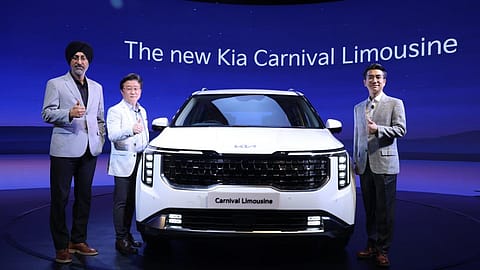Kia launches EV9 at ₹1.3 cr, new Carnival priced at ₹63.90 lakh
Deliveries of these cars will begin by the end of the month.

South Korean carmaker Kia has launched EV9 and Carnival Limousine in India. The EV9, which will be imported from South Korea as a completely built unit, is priced at ₹1.29 crore (ex-showroom). The Carnival Limousine, which will be assembled in India, is priced at ₹63.90 lakhs. The EV9 is equipped with a 99.8 kWh battery, offering a claimed range of up to 561 km.
Kia has already received 2,800 bookings for the Carnival, says Hardeep Singh Brar, senior vice president and head of Sales and Marketing, Kia India. Deliveries of these cars would begin by the end of the month.
Carnival comes only with a diesel powertrain in India. While there are some inquiries for the hybrid variant, Brar says that demand for these alternatives remains relatively low.
Joonsu Cho, chief sales officer of Kia India, explained that when it comes to mass production in India, profitability and production volumes need to be carefully considered to achieve sufficient profit margins. He noted that since the expected volume for the EV9 model is not particularly high, the company is not planning to manufacture these models locally. He, however, added that Kia is also exploring the production of other mass-market electric vehicles in the second half of 2025.
For the previous variant of Carnival, Brar says that the company sold 3,550 units in 2022 and 14,354 units to date. He stated that the newly launched Carnival is not just an updated version but represents two generations ahead of the previous model. He expressed that the response has been very positive and is optimistic about surpassing the sales of 3,550 units within a month of the launch.
Cho explained that the company is currently manufacturing the RHD version of their cars, which imposes certain limitations on their export market; they can only sell RHD vehicles that are currently in use. He mentioned that while they are working to expand their exports, their primary focus remains on strengthening the domestic market. He emphasised that a robust domestic market is essential for boosting exports.
On the government's EV policy, Brar highlighted that they’ve already invested $500 million and the policy does not apply to their company. He indicated that this policy was primarily aimed at specific foreign OEMs attempting to enter the Indian market.
Brar explained that once battery production begins in India, battery prices are expected to decrease, which will lower the overall cost of vehicles.